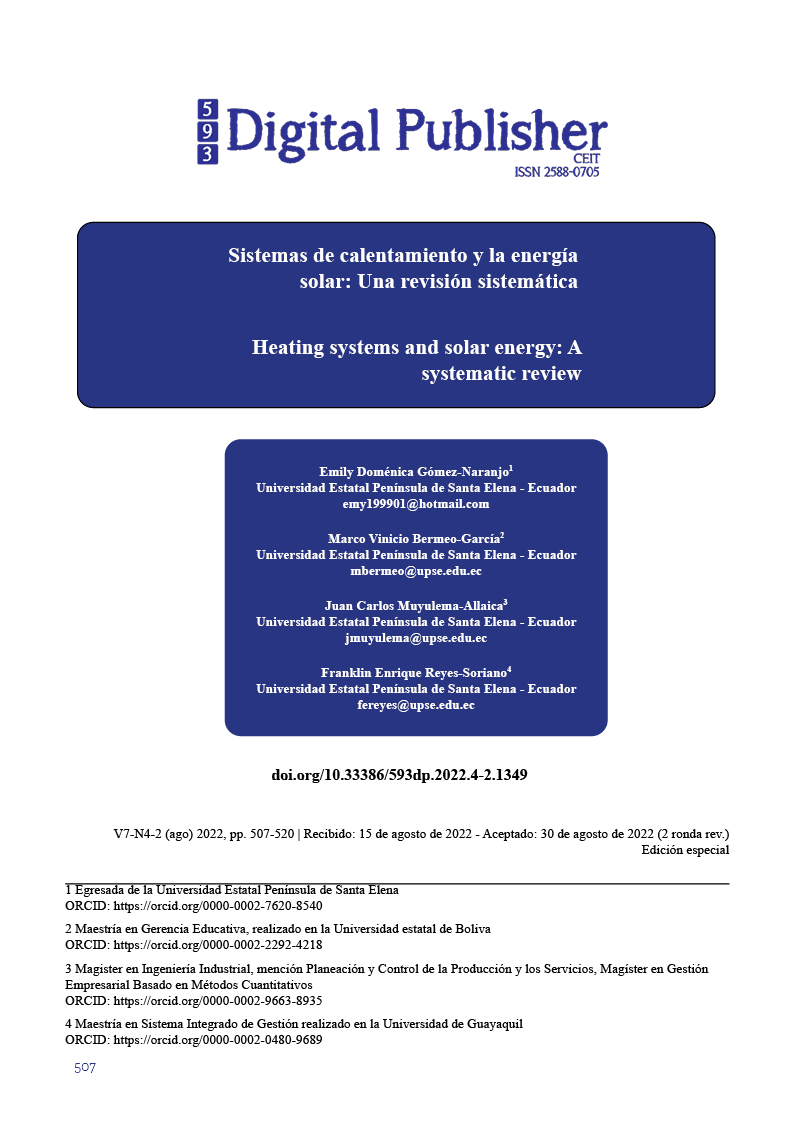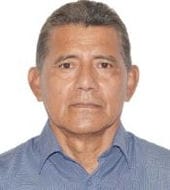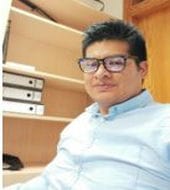Heating systems and solar energy: A systematic review
Main Article Content
Abstract
Introduction. Solar thermal energy (STE) responsible for harnessing solar radiation to transform it into heat is one of the most encouraging forms of generation. Goal. Carry out an investigation through the systematic review of the literature (SRL) to answer the question that tells us: What are the most accurate methods for the development of an efficient heating system using solar energy? Methodology. Work was carried out based on the 3 phases of the SRL, which are planning, conducting and reviewing. The database was limited to a period of 6 years from January 1, 2016 to August 8, 2022. Results. The results determined that the best forms of heating are the use of concentrated STE. Lens-type Fresnel Solar Collectors (FSC) generate a variable efficiency of approximately 70%. Conclusions. It was concluded that the most efficient methods for heating water or steam generation are lens-type solar collectors with temperatures above 100°C and vacuum tube collectors with temperatures of approximately 120°C, however, it is known that Fresnel lenses vary depending on the amount of radiation in the environment, for this reason, they can reach temperatures of up to 600°C depending on the climatic conditions of the place.
Downloads
Article Details

This work is licensed under a Creative Commons Attribution-NonCommercial-ShareAlike 4.0 International License.
1. Derechos de autor
Las obras que se publican en 593 Digital Publisher CEIT están sujetas a los siguientes términos:
1.1. 593 Digital Publisher CEIT, conserva los derechos patrimoniales (copyright) de las obras publicadas, favorece y permite la reutilización de las mismas bajo la licencia Licencia Creative Commons 4.0 de Reconocimiento-NoComercial-CompartirIgual 4.0, por lo cual se pueden copiar, usar, difundir, transmitir y exponer públicamente, siempre que:
1.1.a. Se cite la autoría y fuente original de su publicación (revista, editorial, URL).
1.1.b. No se usen para fines comerciales u onerosos.
1.1.c. Se mencione la existencia y especificaciones de esta licencia de uso.
References
Albizzati E. D. (2018). Estudio del comportamiento de sistemas solares para calentar agua usando un programa dinámico. Renewable Energy, 22(8), 5–24.
Bellos, E. (2019). Progress in the design and the applications of linear Fresnel reflectors – A critical review. Thermal Science and Engineering Progress, 10, 112–137. https://doi.org/10.1016/J.TSEP.2019.01.014
Carrión-Chamba, W., Murillo-Torres, W., & Montero-Izquierdo, A. (2021). Una revisión de los últimos avances de los colectores solares térmicos aplicados en la industria. Ingenius, 27, 59–73. https://doi.org/10.17163/ings.n27.2022.06
Carrizo, D., & Moller, C. (2018). Estructuras metodológicas de revisiones sistemáticas de literatura en Ingeniería de Software: un estudio de mapeo sistemático. Ingeniare. Revista chilena de ingeniería, 26, 45–54. https://doi.org/10.4067/S0718-33052018000500045
Correa-Álvarez, P.-F., González-González, D., & Pacheco-Alemán, J.-G. (2016). Energías renovables y medio ambiente, su regulación jurídica en el Ecuador. Revista Científica Universidad y Sociedad, 8, 150.
Eryener, D., & Akhan, H. (2016). The Performance of First Transpired Solar Collector Installation in Turkey. Energy Procedia, 91(1115), 442–449. https://doi.org/10.1016/j.egypro.2016.06.172
Fajardo-Muñoz, S.-E., & Páez-Fajardo, G. (2016). Simulación Del Tiempo De Calentamiento Del Fuel Oil Para Determinar Viscosidad Óptima De Bombeo. Ingenius, 16, 43. https://doi.org/10.17163/ings.n16.2016.06
Gao, D., Hocksun-Kwan, T., Naji-Dabwan, Y., Hu, M., Hao, Y., Zhang, T., & Pei, G. (2022). Seasonal-regulatable energy systems design and optimization for solar energy year-round utilization☆. Applied Energy, 322, 119500. https://doi.org/10.1016/J.APENERGY.2022.119500
García-Menéndez, D., Ríos-Fernández, J. C., Blanco-Marigorta, A. M., & Suárez-López, M. J. (2022). Dynamic simulation and exergetic analysis of a solar thermal collector installation. Alexandria Engineering Journal, 61(2), 1665–1677. https://doi.org/10.1016/j.aej.2021.06.075
García-Peñalvo, F. J. (2022). Los métodos de revisión sistemática de literatura. https://doi.org/10.5281/ZENODO.6320299
Guan, C., Lu, H., Zhang, L., & Yu, Z. (2020). Regulation of the output temperature in a novel water heating system using solid graphite as sensible heat thermal energy storage medium: Effects of water tank. Energy Reports, 6, 160–171. https://doi.org/10.1016/j.egyr.2020.06.006
Harris, I., & Rodríguez, J. (2017). Caracterización, modelado y análisis de factibilidad técnica de un sistema de acondicionamiento de aire por adsorción, utilizando colectores solares térmicos como fuente energética principal. Ingenius. Revista de Ciencia y Tecnología , 17, 5–14. https://doi.org/10.17163/INGS.N17.2017.01
ICCA. (2015). Energías renovables Energías renovables. In Knowledge Creation Diffusion Utilization.
Ierardi, C., Orihuela Espina, L., Flores, I. J., Rodriguéz Del Nozal, A., & Tapia Córdoba, A. (2017). Revisión sistemática de la literatura en ingeniería de sistemas. Caso práctico: técnicas de estimación distribuida de sistemas ciberfísicos. 8. https://doi.org/10.17979/spudc.9788497497749.0084
Jensen, A. R., Sifnaios, I., Caringal, G. P., Furbo, S., & Dragsted, J. (2022). Thermal performance assessment of the world’s first solar thermal Fresnel lens collector field. Solar Energy, 237, 447–455. https://doi.org/10.1016/j.solener.2022.01.067
Mastrocinque, E., Ramírez, F. J., Honrubia-Escribano, A., & Pham, D. T. (2022). Industry 4.0 enabling sustainable supply chain development in the renewable energy sector: A multi-criteria intelligent approach. Technological Forecasting and Social Change, 182(September 2021), 121813. https://doi.org/10.1016/j.techfore.2022.121813
Mena-Mejía, S.-A., Muyulema-Allaica, J.-C., Bermeo-García, M.-V., & Reyes-Soriano, F.-E. (2022). La norma ISO 45001:2018 y la reducción de accidentabilidad en empresas resilientes. Una revisión sistemática. AlfaPublicaciones, 4(3.1), 187–213. https://doi.org/10.33262/ap.v4i3.1.247
Mokhtar, G., Boussad, B., & Noureddine, S. (2016). A linear Fresnel reflector as a solar system for heating water: Theoretical and experimental study. Case Studies in Thermal Engineering, 8(August 2010), 176–186. https://doi.org/10.1016/j.csite.2016.06.006
Moya-Baeza, I. E. (2020). Orientación y posicionamiento de lente.
Mugnier, D. (2014). IEA SHC Task 52-Highlights-2014. Quality Assurance and Support Measures for Solar Cooling THE ISSUE.
Mustafa-M, S., Farhat, I. A., & Kagilik, A. S. (2021). AIUE congress 2021: energy and human habitat conference AIUE Proceedings of the 2nd Energy and Human Habitat Conference 2021 Investment Promotion in Renewable Energy in Libya; Vision & Methodology.
Muyulema-Allaica, J. C., & Ruiz-Puente, C. (2022). Framework proposal for the design of lean circular production systems based on case studies. DYNA, Dyna Acele(0), 1–10. https://doi.org/https://doi.org/10.6036/10540
Núñez-Naranjo, A.-F., Becerra-García, E.-B., & Olalla-Pardo, V.-E. (2021). Autogestión del aprendizaje: Revisión de la literatura. Explorador Digital, 5(2), 6–22. https://doi.org/10.33262/exploradordigital.v5i2.1649
Origel-Vázquez, J.-D., Ramírez-Martínez, A.-L., & Rubio-Jiménez, C.-A. (2018). Variables Y Estándares Para El Funcionamiento De Un Colector Solar De Lente Tipo Fresnel, Para Uso Doméstico | Jóvenes En La Ciencia. Jovenes en la Ciencia, 4(1), 11–26.
Parreño, J., Lara, O., Jumbo, R., Caicedo, H., & Sarzosa, D. (2020). Diseño de un módulo de energía solar como estrategia de ahorro energético y disminución de la emisión de co2. 2, 4–18.
Ravi Kumar, K., Krishna Chaitanya, N. V. V., & Sendhil Kumar, N. (2021). Solar thermal energy technologies and its applications for process heating and power generation – A review. Journal of Cleaner Production, 282, 125296. https://doi.org/10.1016/j.jclepro.2020.125296
Schoeneberger, C. A., McMillan, C. A., Kurup, P., Akar, S., Margolis, R., & Masanet, E. (2020). Solar for industrial process heat: A review of technologies, analysis approaches, and potential applications in the United States. Energy, 206, 118083. https://doi.org/10.1016/j.energy.2020.118083
Tarazona-Romero, B. E., Campos-Celador, A., Muñoz-Maldonado, Y. A., Sandoval-Rodriguez, C. L., & Ascanio-villabona, J. G. (2020). Linear Fresnel solar collector prototype : Artisanal system for the production of hot water and / or water vapour. 14(1), 35–42.
Tillaguango-Jiménez, J.-R. (2021). Revisión Sistemática de Literatura: Análisis de viabilidad para la detección y diagnóstico de Covid-19, aplicando modelos de Inteligencia Artificial (IA). CEDAMAZ, 11(2), 142–151. https://doi.org/10.54753/cedamaz.v11i2.1183
Varella-Rodriguez, A., Ribeiro-de Souza, D.-A., Rivas-Garcia, F.-D., Lima-Ribeiro, S.-, & José. (2022). Renewable energy for a green future: Electricity produced from efficient luminescent solar concentrators. Solar Energy Advances, 2, 100013. https://doi.org/10.1016/j.seja.2022.100013
Venegas-Venegas, J.-A., Aryal-Deb, R., & Pinto-Ruíz, R. (2019). Biogás , la energía renovable para el desarrollo de granjas porcícolas en el estado de Chiapas. XXXIV, 169–187.
Verma, S., Verma, A., Kumar, V., & Gangil, B. (2020). Concentrated photovoltaic thermal systems using Fresnel lenses-A review. Materials Today: Proceedings, 44(xxxx), 4256–4260. https://doi.org/10.1016/j.matpr.2020.10.542
Wang, Q., Zhou, Y., & Gao, S. (2017). Feasibility analysis of solar water heating system in rural areas. Procedia Engineering, 205, 3852–3859. https://doi.org/10.1016/j.proeng.2017.10.065
Zainine, M. A., Mezni, T., Dakhlaoui, M. A., & Guizani, A. (2017). Energetic performance and economic analysis of a solar water heating system for different flow rates values: A case study. Solar Energy, 147, 164–180. https://doi.org/10.1016/j.solener.2017.03.038





